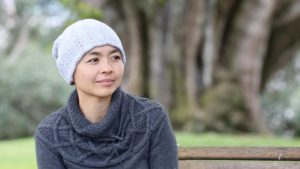
We join Melissa Wei-Tsing Inouye’s family and friends in mourning the passing of this beautiful soul. To honor her, we are republishing her 2019 AML essay introducing her book, Crossings: A Bald Asian American Latter-day Saint Woman Scholar’s Ventures through Life, Death, Cancer & Motherhood (Not Necessarily in that Order). The book went on to win the 2019 AML Creative Nonfiction Award.
Being a bald Asian woman is great, especially at interfaith gatherings. People assume I’m Buddhist. As they approach, I can feel all sorts of enlightened, urbane appreciations welling up in them. Then I introduce myself as a Latter-day Saint. “Oh!” they exclaim. “You don’t look Mormon!”
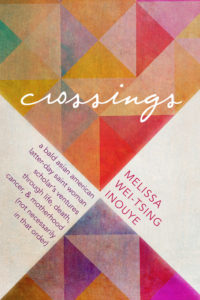 I hope that my book, Crossings, will expand notions of what a Latter-day Saint life looks like. It is a compilation of memoir, essay, personal letters, and university lectures that show the varied textures and traces of this highly practical faith. One person’s life, of course, cannot be “representative” or “typical” of an entire religious tradition. But I do hope that it gives the reader a purchase on Latter-day Saint practice beyond official policies, press releases, and prescriptions from the pulpit. A view informed entirely by such sources is not inauthentic, but it is incomplete. The Church is mostly not church. Mostly, it is what people do in their everyday lives and relationships.
I hope that my book, Crossings, will expand notions of what a Latter-day Saint life looks like. It is a compilation of memoir, essay, personal letters, and university lectures that show the varied textures and traces of this highly practical faith. One person’s life, of course, cannot be “representative” or “typical” of an entire religious tradition. But I do hope that it gives the reader a purchase on Latter-day Saint practice beyond official policies, press releases, and prescriptions from the pulpit. A view informed entirely by such sources is not inauthentic, but it is incomplete. The Church is mostly not church. Mostly, it is what people do in their everyday lives and relationships.
Writing Crossings was easy, for a number of reasons. First, I had the looming deadline of possible imminent physical demise. (I never thought cancer would be good for anything, but it was.) Second, I didn’t write all of it from scratch. Much of it was simply gathered together from pieces stored on my computer or letters stashed in a filing cabinet. Third, the storms arising from church cultural climate change were constantly raging. People were always saying things, and responses kept forming in my head—especially when I thought about how I would explain my position to my kids. One is never at a loss for things to say to one’s children.
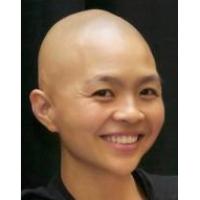 One thing that makes Crossings a bit different as a memoir is its mixed-media format. Some might say that this mixed-media format results in shifting audiences, defocusing the book’s message. I recognize that this is a potential problem. At the same time, I feel that Latter-day Saint life, and certainly life itself, resists rigid segmentation. People pass through many different phases and roles. We are teachers and students, receivers and proclaimers, conservative and liberal, parochial and cosmopolitan, all at the same time.
One thing that makes Crossings a bit different as a memoir is its mixed-media format. Some might say that this mixed-media format results in shifting audiences, defocusing the book’s message. I recognize that this is a potential problem. At the same time, I feel that Latter-day Saint life, and certainly life itself, resists rigid segmentation. People pass through many different phases and roles. We are teachers and students, receivers and proclaimers, conservative and liberal, parochial and cosmopolitan, all at the same time.
There are many letters in Crossings. I’ve loved writing letters ever since I was a little girl in Southern California, corresponding with my cousins in far-away Utah. I love letters for their materiality and long-journeying. When I was a missionary in Tainan, Taiwan, I woke up at 4 a.m. on P-Day to read letters from my family. My mother wrote me faithfully every week. I remember sitting on the slightly sticky faux leather couch in the early morning light, opening the envelope, savoring the voices and scenes from life at home. After reading my letters, I would pull out an old manual typewriter and respond. Tap tap tap, tap tap tap. I told my family about investigators we’d taught that week, noodles and boba drinks, and riding a bike on the paths between the green rice paddies.
The most beautiful thing about a letter is that it is written for an audience of one—a simple communication on a single piece of paper. What happens when one takes a letter out of this private context and publishes it before a public audience, as I have done in Crossings? I’ve thought about this for a long time. One of the reasons for writing this book was to make sure my words reached my children as adults, far into the future. I’ve seen how papers in our family filing cabinet get lost. (Actually, in our house it seems everything gets lost.) I wanted to make sure they had something permanent, substantial, and redundant. So I made this literary lifeboat. God willing, I will have many more years to write new letters to the Bean, Sprout, Leaf, and Shoot, and will always be on hand to tell my children where I have filed them.
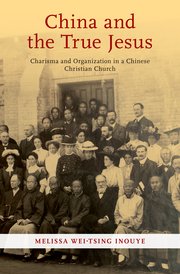 Another way of thinking about letters is that their original audience of one creates an opportunity for candid reflections that can be useful for more than one person. As a historian, I see how letters and other private communications can gradually come to have a broader audience of those who, though not the original recipient, are personally invested in the conversation. I’ve learned a lot about people by reading their letters. It is a way of being present with someone, a way of seeing what they see and feeling what they love.
Another way of thinking about letters is that their original audience of one creates an opportunity for candid reflections that can be useful for more than one person. As a historian, I see how letters and other private communications can gradually come to have a broader audience of those who, though not the original recipient, are personally invested in the conversation. I’ve learned a lot about people by reading their letters. It is a way of being present with someone, a way of seeing what they see and feeling what they love.
This book is, in a way, a love letter not only to my family but also to my sisters and brothers—the Latter-day Saints who throughout my life have taught and led me, disappointed and inspired me. One is hardest on those one loves most, and one loves most those things that are hardest.
2019 AML Creative Nonfiction Award Citation
Inouye’s Crossings is a bold experiment in the Mormon memoir and in 21st century life writing in general. Setting aside traditional autobiography, Inouye has assembled something of a collage of different life-writing genres: personal letters to her children or her students, blog posts published on Patheos, socially sensitive musings on LDS theology, travel essays, family stories, annual Christmas letters (with personally penciled drawings), devotional reflections, parables, and the occasional bit of moral wisdom served up with palatable slices of Chinese history. One moment we are enjoying a short account of two strangers aiding her and her child traveling with a heavy suitcase across the train platforms of Shanghai; the next, she is philosophizing about coping with change (or the lack of it) in the church.
This is the sort of work that could have a certain superficial appeal due to the author’s diverse identities, captured in the book’s subtitle: “a bald Asian American Latter-day Saint woman scholar’s ventures through life, death, cancer & motherhood (not necessarily in that order).” But rather than creating of herself a curiosity, Inouye quickly grounds these identities within a framework of humility and empathy. “I am used to the feeling of being out of place,” she says, and through the range of her travels and trials we recognize just how much she has had reason to feel on the outside of things. But such marginality, she asserts, connects her with others and with God’s larger purposes: “We are all aliens, exiles, sojourners far from our spiritual home. The purpose of life is to come to terms with the depth of this alienation in ourselves and in others and respond with charity.”
Perhaps nowhere does Inouye model this charity better than in her thoughtful, patient essays opened to the pain felt by those who are unhappy with the Church of Jesus Christ of Latter-day Saints or who are immature or unsettled in their faith. Never does Inouye discount the real harms that continue to rankle our ranks due to racism, sexism, and other insensitivities; nor does she belittle the real anxieties of young or beleaguered believers. But, very much in the manner of Eugene England, Inouye plays peacemaker, unwilling to see present challenges as anything less than opportunities for deepened discipleship, more authentic charity, and more informed faith.
Inouye’s idiom is as fresh as her faith. LDS views about relationships are recast as “rich entanglements,” or “the peopled warp across which we must learn to weave our lives.” She justly earns our attention — not so much through eloquence as through a kind of everyday persistence across place and time, trials and travels — that in turn leaves us feeling as though she is a sister, a wise and well-meaning sister who isn’t afraid to be either candid or kind. In Crossings, Inouye becomes Mormonism’s modest Confucius: unassuming, authentic, and utterly trustworthy.
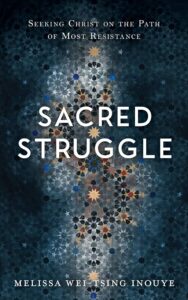 Melissa also wrote a March 2023 AML post introducing the book Every Needful Thing: Essays on the Life of the Mind and the Heart, which she co-edited with the late Kate Holbrook. Also, be sure and find Melissa’s most recent book, Sacred Struggle: Seeking Christ on the Path of Most Resistance, which was reviewed by Conor Hilton here.
Melissa also wrote a March 2023 AML post introducing the book Every Needful Thing: Essays on the Life of the Mind and the Heart, which she co-edited with the late Kate Holbrook. Also, be sure and find Melissa’s most recent book, Sacred Struggle: Seeking Christ on the Path of Most Resistance, which was reviewed by Conor Hilton here.
Melissa is leaving behind a bereaved family. Please consider providing support here:
https://www.gofundme.com/f/7zjjr-help-melissas-family?qid=15f8bfe2cd0123093e3423cff581dd44

I am looking for Crossings in audio. Can’t find it but she highly recommended this format?